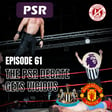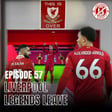Become a Creator today!Start creating today - Share your story with the world!
Start for free
00:00:00
00:00:01

From Lisburn to The Gambia: Johnathan McKinstry on becoming a manger at 27, his coaching philosophies and travelling the world
Join hosts Killian and Conor as they sit down with globetrotting coach Johnathan McKinstry! 🌍⚽ In this episode, they dive into McKinstry's incredible journey from Lisburn to The Gambia, his new coaching role, and the philosophies that have shaped his career. Don't miss this inspiring and insightful conversation!
Transcript
Introduction and Coach of the Year Award
00:00:17
Speaker
Hello, hello, hello, and welcome to the Not A Pundit podcast. This is a very, very, very special episode because, Connor, we have somebody that it for the first of the podcast, is Coach of the Year. And our congratulations goes to one Mr. Jonathan McKinstry. Jonathan, how are you? No, thank you very much, Killian. Yes, um obviously just yesterday, that was a nice sort of sort of cherry on the cake in terms of my time in Kenya for them to sort of acknowledge it with the Coach of the Year Award. But yeah, in general, very well. Thank you. Good to join you guys. And yeah, looking to get into it.
Transition to Coaching Gambia
00:00:54
Speaker
Yeah, and congratulations on the new job because when I first messaged you, you were just leading Gore Mahia to the Kenyan Championship, and which you did very, very successfully. And then you were made international coach of the Gambia. But we will come back to that but later on. I do want to start by saying I'm a Sunderland fan. So your beginnings kind of i ah They're not for me, but Connor here is a Newcastle fan, and you came through the Italy development there. How did that come about? Yeah, so um you know Connor may have thought in common. you know I actually grew up, I was the only person in black and white in Northern Ireland
Influence of Newcastle and Education Path
00:01:37
Speaker
growing up. Everyone else was in Liverpool or Man United or Rangers or Celtic growing up, whereas for me,
00:01:43
Speaker
You know, there's a family connection there. my My aunt married into a family where one of the brothers played for Newcastle United in the 80s. I don't know what you would term that officially, a half uncle, a quarter uncle, I don't know, an uncle in law. A black and white uncle. Yeah, exactly. So he played for Newcastle in the 1980s and then he actually got injured quite early. He was Newcastle's youngest ever goal scorer at the time, got injured quite early. and then came back to be physiotherapist of the first team and the Kevin Keegan era oh continued for the next sort of 15 years under numerous managers so you know growing up as sort of a kid in the 90s in Northern Ireland.
00:02:23
Speaker
I just, well, I think it was partly the fact that he'd been there and was there, but also then, yeah, just this football and Newcastle United were playing in the 90s. So yeah, I grew up black and white. And then, you know, going over to university at Northumbria University to study sports science, you know, part of the reason was to be close to Newcastle United. You know, I had other options to go to Stirling University, to go to Harriet Watt. you know i think love frozen option as well but northumbria had a really strong sports program. So that was the primary consideration but be on that the idea that you could be living in the city and going and watching new castle on a semi regular basis was a big pool and and then you know once i was in
Early Coaching Experiences
00:03:08
Speaker
the city. It was like okay i wanna be coaching you know i need to have a part time job putting myself through university i already done some of my coaching badges and so really,
00:03:17
Speaker
you know just being in contact with sort of the football in the community the advanced development centers there at new cassey united and yeah you know for me it was a great you know to have that badge on at what nineteen twenty twenty one years of age and going out into the community working with sort of the young players so yeah it was it was a nice sort of introduction to football and it you know working for the club that i've grown up sort of quite fanatical about as a child, And I generally was fanatical. I remember running around the house when, you know, the likes of Rob Lee or Warren Barton or, you know, Paul Kitson would score a goal. And my mother sort of looking at me as though something was wrong with me. But, um, I didn't get in, getting the free swag every season to, to, to walk around and get paid to wear.
00:04:03
Speaker
Well, that was it. You know, I think, you know, for all of us involved in football, I think we're very sort of privileged that we get paid to to work in this game at all. But yeah, as ah as a young man, you know, just out of high school to be getting paid, you know, a reasonable level of money to, you know, put myself for university and to yeah wear the badge of the club that I grew up supporting. Yeah, was it was it was a very nice thing to be able to do at that stage. Did you go straight into the youth kind of academy side of things, or did you start out at Newcastle Foundation, or what was the story there? It was the foundation primarily. um you know At the time, I had obviously just done my B license. And yeah, it was more working around you know with the schools, with the after-school clubs. And that sort of led into working. There's sort of a stage between that and the academy, which is like but at the time was called like the Advanced Development Centers.
00:04:55
Speaker
where those young guys in the community who we thought had some level of promise potential were sort of brought into this, you know, bring the good ones together and see who sort of who's head rises above the rest. So, yeah, it was it was that over a couple of years at university, which was it was good, you know, working with all levels of players. um And yeah, it was a good grounding. I always say, you know, I think at university, I was I was coaching more hours a week than I was actually in class. That was You know, i i was I wasn't, I was turning up for my lectures, but it was just, you know, the modern day universities, and it's, it's 10 or 12 hours of in-contact time. And yeah I think I was coaching between Newcastle, I was coaching the university men's team as well. I was coaching an under 15s team in Gateshead. I think I was doing sort of 14 or 15 hours of coaching a week.
00:05:47
Speaker
and then also almost supplementing that with my degree. so Probably learning more from being on the pitch than being in the in the lecture halls, to be honest. I think it was a balance. you know In essence, I've always believed that you need the practical, but at the same time, good ideas need theory, need reason behind them. and so But at the same time, my struggle with university or my query was always, this is all grand in theory, But how does it help me make a better footballer? How does it help me make someone score more goals? How does it help me get someone to run faster with the ball at their feet? And sometimes, and look, I'm going back 20 years. Sports science degrees have probably changed quite a lot now. But I remember at the time thinking, this is all great in a laboratory setting. But how does it really apply and in the big, bad world out there? So I think having that balance was was very important.
00:06:42
Speaker
No, it's it's it's interesting you say that ah a good buddy of mine actually did sports science in in Newcastle and was kind of coaching with the foundation as well and he had the same qualms with the with the kind of education side of it, of the theory was great, but like you said, it was, you know, it's it's not teaching you how to nurture players. But I think if we go any ah go on any further about Newcastle, Killian will probably explode. I will have to say one good story I've got to tell Killian, the first time I ever encountered a Sunderland supporter was in Belfast the day after the Charlton playoff final.
00:07:14
Speaker
um And I thought, first of thing, I thought fair play for wearing that shirt the day after that playoff final. and But I did probably laugh out loud to the point that he could hear me on the other side of the screen. I was quite young at the time, but that was a long time ago. You've you've maybe got over that penalty, Miss Killian, by now. just Just about, um like what that's what we call a repressed memory. and i like bring it up Deep in the filing cabinet, yeah. But like oh for anybody that has kind of like googled your name and seen your Wikipedia, like globetrotting kind of seems to like might be a word that comes to
Impact of Red Bull's Philosophy
00:07:54
Speaker
mind. and You kind of started that early enough. so You went from Newcastle to New York
00:07:59
Speaker
i'm from new york to add that's where you can in major in introduction to africa with the right to dream at foundation. How was new york is that was ah around the time that they had just become red bulls was it over the still metro starts. Yeah no i landed in new york just after maybe. I want to say it's six months, maybe 12 months after the red Red Bull had bought the club. And like, it was wonderful. It was fantastic. um You know, I think I owe a lot of my career to those sort of two and a half years in New York. and Everyone sort of knows the Red Bull
00:08:34
Speaker
sort of model around the world for producing talent, you know, young players, the amount of players who've come through Leipzig, Salzburg, New York, there was the the Academy in Brazil, there was one in Ghana for a period of time. And the amount of players who've come through that. But I also think if you actually look at a lot of coaches who work around the world who've come through Red Bull, like I can name, him you know, I know four or five guys who I personally worked with who work in the English Premier League and Championship. as sort of assistant coaches, goalkeeping coaches, etc. Obviously, you know, they might have had coaches who've come through that system likes of, you know, Hassen hoodle, etc. You know, Red Bull was this real talent factory for coaches. And so for me to go to New York, you know, and I don't know what came first, it's sort of a chicken and egg scenario, because for me,
00:09:26
Speaker
the way Red Bull play in terms of that sort of that aggressive, that going toe to toe with people, that quite vertical approach to the game. And it's a game model that spread out, you know, you could call Borussia Dortmund, Liverpool, you know, Leeds United, all of these teams play, you know, Southampton play a version of that Red Bull DNA now, which all obviously started Jared Hulier was sort of the director of football at the time. You forget that, actually. Yeah. Yeah, so Jared Houlier was Red Bull's director of football before, and you know, Ralph Ranjak and stuff got involved. So he was really the sort of, you know, the starting point of that. And so I don't know, was it because of Red Bull, I think like that? Or did I think like that? And therefore, I fit it in really well in the Red Bull ecosystem. Yeah, and probably a little bit of both really.
00:10:19
Speaker
But I also think the high standards at a club like Red Bull, you know, they have impeccably high standards, you know, even I was working with the best young players from sort of 10 to 15 years of age. And I was very fortunate to be working in that economy pre-academy setting. But even for the guys who are out working in the community with the local community football clubs under the Red Bull banner, the standards that the club expected of everyone who put on that jersey on and off the field you know in terms of reputational you know importance and was so high and so for me you know i was given i was given my autonomy to go and coach which i always wanted.
Soccer Growth in the US
00:11:03
Speaker
yes we had a free and work within red bull but you were then said right stay within this framework but go and coach you know you put your sort of spin onto it and so i think that was so important for me and look when i was in new york i was coaching like twenty hours a week. I'm which at the age of twenty one twenty two so important to get that practical experience on the grass every day so yeah i'm really important time for us and yeah just really pleased about being there and really thankful for.
00:11:36
Speaker
how How did you find the kind of introduction to, because around that time was kind of the re-kickoff of the MLS and football in America. Like, it there was kind of, there was the original NASL, then the MLS came true and it was kind of a barren land for a while other than Carlos Vladirama. And then kind of around the time that Josie Altidore came through, there seemed to be kind of a re ah-emergence where Americans kind of go, oh wow, we have some players that are coming from our own leagues because Clint Dempsey had already gone, Casey Keller was already in the UK.
00:12:16
Speaker
And how did you find the kind of the reception of being in new york and working with a club just as they were had this fresh own not just ownership but kind of a fresh interest in the league. Yeah, well, actually, as I el landed in New York, was at the same time a certain Mr. Beckham was landing in LA. So actually, I think it was within the first couple of weeks of me being in New York, it was the first big, I don't know whether it was Beckham's debut, or whether it was a second game, but Red Bull played LA Galaxy at Giant Stadium, and there was like 80,000 people in the stadium to see David Beckham.
00:12:57
Speaker
And so yeah obviously the league sort of kicked off what ninety seven and ninety eight it was a couple of years after the world car no ninety five nine six a year to after the world cup the league kicked off and so by what time would that have been around two thousand and seven it's sort of been going for a decade. but now was really, there was a huge investment going on in the league. Like even at Red Bull, we had Yuri Jorkaev was in our team, Juan Pablo Angel was in our team, Claudio Reina was in our team. Obviously, you know, as I left two years later, they signed Thierry Henry to replace me.
00:13:38
Speaker
But the, you know, there was now this, they were starting to invest to bring the megastars into into MLS, which probably really hadn't happened in the first decade of it, really. And so it was big investment into it. And so the interest was growing, you know, the interest in soccer in the United States has always sort of been exponential, you know, it's so huge, it's just then how do we get, I do think soccer in the US has sort of almost like a buffer at that college age, i where at 18, 19, kids go from playing, you know, every day or whatever in an academy setup, and then you go to a college system where it's, you're playing two games a week, your seasonally lasts for three months, and you're going to do that for, you know, a few years, and then you're expected to come back into professional soccer. So there's definitely this buffer that
00:14:33
Speaker
is causing challenges in the united states and that was there then i think it's still there today and but it was it was a great time to be there and look when you were working with that red bull by john you know when you're working with young the top young kids you know I always say in the United States, the respect a coach is given is is, you know, five stars right up there. You know, if you say to someone in the UK or Ireland that you're a youth soccer coach, they'd be like, oh, that's nice. Whereas in the United States, it's being a youth soccer coach really
00:15:08
Speaker
elevate you, you know, you're really respected. The role of coach, that term coach, is really respected in the United States in a way that I'm not sure it is back in the UK
Coaching Philosophy Development
00:15:20
Speaker
and Ireland. And do you think that's a fall out of American football coaches or like as in and the risk because obviously would see the football programs and the basketball programs lead sports over there for for the most part from a collegiate level. So do you think it's a fall out of that or just a general difference of respect for coaches? i think it's I think it's on a couple of levels. I think, ultimately, sport is seen as such an important facet of youth sort of development in the United States because of the college scholarship opportunities. you know College costs so much money. So if your kid, you know male or female, can show talent in a discipline away from the classroom, or and and in addition to the classroom, whether that's sports, music, et cetera, then the opportunity to get some of your college paid for, all of your college paid for is significant. And so it's like if if a family can find a good club, a good coach, then they really want their son or daughter to
00:16:18
Speaker
really just, you know, go with that because of what it can save you down the line. It can be hundreds of thousands of dollars. I also think in the United States there is such, I don't know, this might sound wrong, but there's such an obvious put the child first mentality in the United States. You know, it's so, you know, children are the center of everything. And it's I'm not saying that's not the case in Ireland or the UK. It's different, though. It's so blatantly obvious in the United States. um And so, yeah, I just think when you're then involved in that cross section of looking after sort of the children and young people in your care, and then also being a support structure to help them through
00:17:08
Speaker
You know that academic journey into college i just think yeah you're seeing a such an important call in the process of developing that young person. Obviously for like most coaches it starts out in in a youth system and you know some coaches go straight to your men's senior team or women's senior team. But do you find, or have you found that working and across kind of youth setups or with with younger players that it's kind of informed you as a coach kind of with the senior team? Cause if you kind of being able to nurture the younger players, it's, it's, to me, you seem would be easier with the senior players then.
00:17:43
Speaker
Yeah, 100% Connor. the um For me, I'm very privileged. I've coached at every level of the game. You know, when I was 16, 17, starting doing like my mini soccer leaders award of the Irish FA, I was coaching the six and seven year olds on a Sunday morning down at the local rugby club in Lisbon. coaching them football, I should say. But it might not have looked like football, some of the technique, but it was. um but you know And I coach from that, obviously, the schools program in Ireland and Newcastle through academy setups, through to running my own academy in West Africa into you know coaching the university players at Northumbria.
00:18:25
Speaker
coaching club, coaching international. And I'm very fortunate to have worked at all levels of the game. and And I do think that informs me. I think you learn how to coach coaching youth players. You know, I do think I know there's especially former pros who go directly from playing to coaching senior players. And look, they've got this big sort of encyclopedia of coaching sessions and ah knowledge that's hidden away in their brain. but have they learned how to coach? Have they learned how to transmit that knowledge? And that's what I always say to any coaches getting involved or having ambitions in the game is for them, go and coach everybody. Coach the six-year-olds, coach the 20-year-olds, coach the boys, coach the girls. I even, when I was younger, I did, I'm actually, well, it's probably expired by now, but I i did a qualification in coaching players with disabilities.
00:19:17
Speaker
You know, so even when I was young, when I was at university and with the Irish FA before I went to university, I used to go and do some of the disability football coaching as well. And it's all communication. It's all about how do you communicate an idea to somebody else. That's that's that's at the base of it. And so you know all those years all those hours coaching all different abilities in all different types of environments pitches weathers you know what do you do you got your session plan sort of what do you do when it starts pouring with rain. You know it's like okay maybe today we want to do something different have something ready to do so yeah i think i think i haven't coached at all levels of the game really has developed me that.
00:20:02
Speaker
I can sort of roll with the punches, if
Appointment as Sierra Leone's Coach
00:20:04
Speaker
you know what I mean. You know, whatever's thrown at me in a coaching environment, you know, somebody's injured. We don't have a certain amount of players. We, you know, the facility we have is not what we expected it to be. We don't have portable goals. Whatever it happens to be, I think I'm quite adept at sort of going, OK, give me a minute. Let me think about it. OK, this is what we're going to do instead. Now in fairness, that is perfectly proven by your first kind of men's full-on role with Sierra Leone. Like you were, what, 27 going in? Which that in itself, you were probably coaching players that are older than you. But then also, it was the outbreak of ah Ebola. And through all of that, you got Sierra Leone to their highest world ranking that they'd ever been to. And you got them to the African Cup of Nations, despite the fact that every other nation in the tournament didn't want you there.
00:20:55
Speaker
One, how did you end up with with the job and two, how did you handle taking on that kind of role and jumping up from ah Academy and ah a the developmental end of things? Yeah, like I think we also have to appreciate in life some things do some things are about right time, right place. You know you need to be ready to take an opportunity, which I always tell people. I was like, don't wait for the opportunity. Be ready for it, because if you wait for it, you don't have six months or six weeks or six days to prepare for it. You got to go now. You got to be ready to race as soon as the light goes green.
00:21:37
Speaker
and And so for me, Sierra Leone was ah really an opportunity that was right time, right place. I was obviously running the academy in Sierra Leone. I'd been there, I think, three years at the time. We were the only sort of full-time residential football academy. We had the best young players in the country living with us, working with us every day. you know a number of them were in the youth national teams i was an a license coach at the time and i was living in the country full time and the the swedish coach i believe basically he he quit he resigned and there was a three world cup qualifiers remaining.
00:22:15
Speaker
And Sierra Leone had a, you know, a feathers width chance to qualify. It really wasn't a huge chance at all to qualify anymore of three games to go. And it became obvious just sort of in local football circles that they were going to go for let's say a lower budget option they were gonna say right let's give it to someone who's coaching in the Sierra Leone Premier League because then we don't we just have to pay salary we don't have to play pay flights hotels visas you have to pay for all of that and and as soon as i became aware of that.
00:22:50
Speaker
I just thought, right, let's make a few phone calls. Let's set up a meeting. Because I just felt, even though I was only 27 at the time, I felt I was the best coach currently boots on the grind in Sierra Leone. And I'd watched a lot of the national team, you know, obviously with the academy, we'd always have even the away games on the TV at the, you know, when they were playing. And so I sort of knew the players, I i knew who they were, I knew what I felt their strengths and weaknesses were. And if I'm honest with you, Killian, even before that, I had
00:23:23
Speaker
I believe that would get the opportunity to become the Sierra Leone national team coach at some point i remember doing a class about goal setting with our players at the academy one day in the school and i sort of mapped out my next twenty years and i said to them look i don't know the meandering road that's going to be between each of these but i said look here i am a sort of the academy lead at the at the academy i think at some point i'll get the opportunity to coach the national team if i stay here for a while It came earlier than I expected. I went into that meeting. I presented, look, next game's against Tunisia. This is how we can beat them um at home. They'd never beaten Tunisia in their history. um And this is what I think we can do with the national team. And yeah, for them, I think it was a low risk option because there was only three games remaining. I was in the country. They were cutting their costs. And for them, also probably, they looked at it and thought, this might give us a bit of a media bump.
00:24:19
Speaker
you know if we appointed twenty seven year old is gonna make the news but and on on that i think we should say that when you when you took that job you were at the youngest head coach in of a national team in world football like you know that is that's that's not nothin yes so it definitely made the news but so but i also have to understand that and i think people have to acknowledge that i've been sat double in a plan for that job. There was no, there's no way they were appointing me. You know, I was in a different race. I always say to players, even now when I'm picking a team, don't look at the appearances the right winger has. If you're the left back, don't be saying to me, Oh, but the right wingers only playing 10 games a season. I'm playing 40 games a season. I'm like, but you're not in the same race as him. He's in a race with the other wingers. You're in a race with the other left box. And so for me, I put myself in a race of people based in Sierra Leone.
00:25:12
Speaker
not people all over the world. And so in that race, I was the only A license coach, you know, I was, I hate to say it, you know, some African nations do have a preference for a foreign coach. And, and so I was in essence, giving them that option of a foreign coach, foreign UEFA qualified rather than calf qualified. And, and so I narrowed the field and, And they decided I was the best choice from a field they wanted to select from so
00:25:44
Speaker
I, you know, very grateful for that opportunity. And look, but like I said, it was, that was the first thing, you know, getting the job was the first thing, but then it was, as as you've said, Killian, you know, a large proportion of the squad were older than me. That Sierra Leone squad was quite a mature squad. Um, you know, we had several players in their thirties, a number of players in their late twenties. And so I would say. probably 60% of the players were either my age or older than me when we walked out onto the train and pitched that first day. so yeah that was And then it comes down to, you're ready to coach. And all of those years, coaching the young players, coaching all different levels, you know I just said to my staff, we just go out and do what we do.
00:26:31
Speaker
you know And if it's good enough, it's good enough. If it's not good enough, the players will soon let us know by their reactions, and we'll know a little bit of information. But what else can we do? We can't do
Managing Team Dynamics and Challenges
00:26:41
Speaker
anything else. So let's just go and and do what we do. Being around the same age as as the players. Like, you know as Killian's saying, is is it terrifying? is it Are they kind of half expecting you to be a friend because you're the same age as them? Because you know we see the likes of Nagelsmann, who's, I think, 34. And you know, you you wonder, how does that operate as as the manager? Like, do they try play on you as ah as a friend as opposed to the manager? Look, I think when you're I think this is true of all the age categories. I think it for the media and for the people in the outside, it becomes more of an assumption when you're a similar age to players. But the idea of being sort of
00:27:24
Speaker
um What do they call it in sports degrees? They used to call it being a significant other. You know, you're a significant other in the process. So I'm not above you. I'm not below you. I'm beside you helping you achieve this goal that we're we're marching towards. And so for me, that's the way I've always seen sport. You know, now I'm almost 40 and I'm dealing with, you know, 21 year olds, 19 year olds. And I don't, I don't think I do it any differently now. Um, I probably have a few more tools in my sort of toolkit to do it than I did 20 years ago or 15 years ago, but I still think I approach it as being like, I'm here to help you be the best version of you. And so that was sort of the same way when we went in with Sierra Leone.
00:28:08
Speaker
It was, I can't remember exactly what we said in the opening meeting, but I think it was something along those lines. It's like, look guys, I'm here to give you a roadmap and together we're going to try and and get somewhere. You know, we're going to try and get to our goals because you want to be successful for your country. You want to be successful for yourself, for your family. We've got an idea and we're going to work together on it. Now, I do think players will probably test you a little bit more if you are the same age or younger than they are. But again, for me.
00:28:41
Speaker
You've got to remember, this wasn't my first time in a management role. I've been running my football academy for a number of years. i'd been even Even though I was only like 22, 21, 22 at Red Bull, i was one of the you know I was one of the coaches helping develop the curriculum at Red Bull. So I've been somewhat of a senior coach at Red Bull, even when there was other coaches who were maybe 10, 20 years older than me. So it wasn't my first time in a management or leadership position. And so even though I was very comfortable at being in that significant other category of supporting an athlete to be better, I also knew where my boundaries were, where those lines were. And I'm not someone to shout and roar at people because I don't need to. When you're the coach, you just drop them. You just set them aside. I remember reading once the coach's most powerful tool in terms of implementing his authority is the bench.
00:29:44
Speaker
And it's very true. And so I think that was like a basketball coach said that I think it was one of the American basketball coaches I read that from it's like your most powerful ah authoritative tool as a coach is the bench. And so that's it. you know It's my decision. I don't need to shout and roar at you. I've always been of the belief that you're here because you want to be here. This is not a prison. You're not handcuffed to the the team bus. If you don't want to be here, then don't be here. and If you want to be here, let's work on it. Let's get there together. So yeah, i i there was butterflies in the stomach before that first training session. naturally
00:30:23
Speaker
But we just ultimately went out and did what we did. and And it worked. And the players responded well to it. And some of them some of them pushed back a little bit on one or two of the things we wanted to do. But we didn't say we didn't turn around and say, oh, no, we're doing it because I say so. We say, well, come and stand in front of the tactics board and you tell us your questions and we'll walk you through why we want to do it our way. And so after those type of conversations, regardless of whether the player agreed with you or not, But what they were clear about is that you knew why you wanted to do it. And so if they see that confidence and that theoretical underpinning to why you're going that direction, then they give you the chance to say, OK, let's go that direction, because you're not just picking it out of the sky. yeah I think that's transferable to anything. you know I think both in a business perspective, I think it's it's just leadership, really. you know
00:31:17
Speaker
It's a little bit of a Brian Clough and you can disagree with me and I can disagree with you and in the end we'll all agree that I was correct. you said It's very funny you say that Kelly and so I've got I've got a few interesting things on my wall behind where you are at the minute up behind my computer screen and one of them is actually a I wrote to him when I was very young. So I've got a signed photograph from Brian Clough in the wall that says, best wishes, Jonathan Brian Clough. And it's just one thing I've sort of got up on the wall. and that's That's very cool. dance behind me yeah So Brian Clough was definitely someone who I, you know, had a great affinity for and admiration growing up.
00:31:56
Speaker
Well, I have to say, you know, Brian Clough, everyone would, would call a risk taker. And I think it's fair, fair to say that you're, you're, you're in that category too. Like, I mean, what, what has asked you to to set up an Academy and in West Africa, you know, coming from Northern Ireland, I guess that's a bit of a hop, skipping a jump, you know. Yeah, look, it was just for me, I was offered the opportunity. You know, obviously, I'd had that connection with the Right to Dream Academy in Ghana. They were employed or brought on board as the consultants for set up the foundation, the Craig Bellamy Foundation in Sierra Leone.
00:32:29
Speaker
And they approached me about would I be interested, initially being like the technical lead in charge of like the football side of it. That eventually evolved over the years to having a more wide ranging sort of authority position. But it started with purely the football. and And for me, there was sort of two things that influenced that decision. Number one was I always knew I wanted to go to the pro game. The the reason I'd left the UK was At the time, there was no real evidence of an academy coach making the jump to senior professional football in England or Scotland. There was lots of evidence of it in Germany and then in Spain, but not really in the UK. And so for me, I thought, right, I've got to go away, prove myself, elevate myself to the professional game, and then maybe I can come back into that top five league context in 20 years time. I don't know.
00:33:25
Speaker
And so that was part of the reason for going to the United States. And so when the opportunity came to go to West Africa, even though I was really happy in the position in in the United States and really supported in the role at Red Bull, I just always think, and even to this day, you can achieve great success in the United States and the European game will look at it and go, yeah, but it's the United States. yeah um I think that's the way it is. and rightly or wrongly. Whereas I looked at I thought if I can go to West Africa and if I can develop players who move to the Premier League, who move to France to Spain, my name in some way will be attached to that development process. And that will elevate me to get these opportunities I seek in the in the mediums along term. So that was the first thing. I just thought the spotlight on the African game was greater than the spotlight on the American game.
00:34:24
Speaker
And then the next part to it was, I was in Red Bull, okay, I was involved in helping to create the curriculum, et cetera, but I wasn't the lead. You know, whereas in Sierra Leone, it was a blank canvas, it was a brand new academy, and I was going to be able to take whatever was in my head and distribute it to these players and see if my idea about football development and my idea about the game worked. That was, and so it was a risk. It was like, maybe I'll go here and it'll be a disaster. And then what I'll know is that, you know, okay, maybe I need to adjust my thinking on the game. Maybe what I think isn't the right way to do this. Um, but equally it was going to, it was, it was one of those, it was a litmus test. it is Is it right or is it not? And so, or not that is it right or not, but does it work or not?
00:35:15
Speaker
and And
Academy Management During Ebola
00:35:17
Speaker
so that was it. It was a bigger spotlight, and it was a test of what I believed about the game. And both of those things, I just thought, yep, that's enough reason to trade up a Manhattan skyline for a fishing village in West Africa. So, ah yeah. as As Killian mentioned, like and and and if you if you don't want to touch on this topic, absolutely no probably you know you were there during the Ebola crisis, which which obviously was world news and and incredibly sad. What was that like, to even just even aside from football, just to be in the country at that point? Yeah, it was incredibly challenging. um you know We saw it from two different angles, because obviously we're still running the football academy at the time, and then also with the national team. and so
00:36:02
Speaker
like the country just like everyone experienced what a lockdown was like in the last few years in yeah terms of the covid pandemic but we i'd sort of and my staff and the kids because what we did was we'd heard quite early on from our sort of staff in the regions that something was happening before it became world news before it even became free town news we were aware because we had players families from the border regions in sierra leone and so we had become aware that something was happening that there was some sort of virus you know that was affecting people quite badly no one knew that it was a bowl at the time but we became aware that something potentially serious was happening.
00:36:44
Speaker
As we understood that it was Ebola, we actually invited a lot of the, all of the Academy families to come to the Academy and we gave them a workshop on how to sort of stay safe. You know, we gave them supplies, like so it's like sailing solutions, like all of these things that would help them wash their hands and just the bait. Cause the thing about Ebola is to avoid Ebola is pretty straightforward. If you do the right things, you're going to avoid it. But if you don't avoid it, it's devastating. And so um we did that with the Academy families. And what we then asked them, we said, look, everyone else is closing down. If you want, you can go home with your kids. However, if you would like, we are willing to keep the Academy open. And what we'll do is we'll lock the gates. And only myself and the driver will go out every two weeks.
00:37:39
Speaker
to get supplies in a safe way, and we'll come back, but no one, and we asked our staff the same, who's happy to stay here on site, live on site. We had accommodation and and understand that you're not able to leave because the moment you leave, you're not allowed to come back. Um, because we can't control the bubble. And, um, and yeah, we ended up, everyone stayed, all the kids stayed, you know, we, we operate over skeleton staff for, It must have been six or seven months you know where we where we just locked the gates. We went on to a reduced curriculum. um The kids were still going to school every day. We're still training every day, playing and internal matches. I got remarkably good at table tennis.
00:38:24
Speaker
know um I think my, my best run was beating, I think I had 21 victories in a row game after game, one weekend with the Academy kids. And, um, you know, we had the the projector to show them the football and stuff at the weekends and yeah, it was six or seven months of a real lockdown. Yeah. And, um, yeah. And it was, you know, I still remember even at the time, you know, people. I remember like certain news outlets wanted to come and do stuff and we just said no, we were like, this this isn't what this is about.
00:38:59
Speaker
You know, it's the families have asked us to look after their kids at the very outset when they agreed to come to the Academy as a scholarship. We said, we're going to look after your kids. And this we just felt was an extension of that. So so that was one side of it. And then with the international team, the Sierra Leone national team, it was it was another side of it because we weren't allowed to play home games. No one would travel to Sierra Leone. When we went to away games, we were subjected to quite stringent testing, which included the Ivorian government or medical wing deciding that 4am in the morning was the right time to do temperature checks. let's say only hotel you know so um you know And whether that was all authentic or gamesmanship. i think it's a bit of shit hosy all right yeah
00:39:48
Speaker
Well, we went through that and um and it was an experience. And so, yeah, it it then meant, you know, when when the COVID pandemic happened, um both myself and anyone who was involved in Sierra Leone at that time sort of already knew that knew the score, knew how to, the processes, at least in some ways that we'd have to go through during the pandemic. So, um yeah, but Ebola was really tough. It was it was a devastating time. and it's It's odd to think back to that time. You know, I still remember me and our driver, Mr. Kamara, going into the city to get like food supplies for the Academy one weekend or one week.
00:40:31
Speaker
And you're going past and you're seeing, you know, like the medical vans with people in the full hazmat suit, going the opposite direction and stuff, or you'll see a crowd of people gathered around someone who's maybe collapsed in the street and the people with hazmat suits coming to sort of get the body. Um, so it really was, it was quite, yeah, it's hard to even describe. I don't know the word for it, but it's, yeah, it was sort of, a it made you, assess the important things in life, definitely. So not a nice thing to live through, but also I think something that you learn a huge amount from um and you you don't go through those type of experiences without learning
Achievements with Rwanda and Uganda
00:41:16
Speaker
something just about everyday life and about the importance of certain things.
00:41:20
Speaker
Well, it's a definition of, you know, siege mentality in football is thrown around a lot, but that that really is the definition of it. And hats off to you, not even blowing smoke. To be able to to carry a staff and and a and a group of players through something like that is nothing short of incredible. No, thank you. And with Sierra Leone, obviously you had great success on the pitch as well, guiding them to their highest world ranking, but it's not the only nation in Africa you've done that for as well. and I believe you did it with Rwanda then after, brought them to one, if if not their highest, one of their highest and and got them competitive on the ah some of the continental tournaments um i i'm not sure if it was it was afcon or was it it was it was another one in 2015 the african championship of nations so we got to the quarter final so that's people might not be aware listening africa calf have two competitions so they've got the african cup of nations which everyone sees most of the time they also have a competition called the african championship of nations which is
00:42:22
Speaker
It's like retro off because it's players who are based in their country so if you want to play for Rwanda at the African championship of nations then you gotta be playing in Rwanda. Oh ah yeah so youre you have to be Rwandan but you've also got to be playing in the domestic league and so when I say retro off call it's about like as if you go back to the Afghans in the nineteen fifties and sixties there wouldn't have been players playing in Europe. Whereas now, Afghan, pretty much every player is playing in Europe, Asia or the Americas. So Chan, as it's called, the African Championship of Nations is really like when you step foot in the countries, it's played in the big stadiums. The stadiums are full of capacity, but it's there's almost more of a connection because the supporters, these are the players that the supporters see every week for the dam domestic club they support.
00:43:16
Speaker
And so there's a real just connection to it. And and yeah, so with Rwanda, we got to the quarter finals of the African Championship of Nations. and With Uganda, we qualified for it as well and did well in the Afghan as well. So yeah, I think post Sierra Leone Sierra Leone was a bit more about the world rankings. With Rwanda and Uganda, it was more sort of top tournament results, which I think ultimately is the thing you want to go on. You know, it's nice to It's nice to do well in world rankings, but at the same time, you know, the prizes in football are about how you progress in tournaments. You know, Belgium would happily swap there.
00:43:54
Speaker
whatever it was three or four year stint is number one in the world right here for a European championship or a World Cup. So yeah, world rankings nice and definitely for Sierra Leone, it was a step in the right direction. But for for Uganda and for Rwanda, and ultimately now the charge with the Gambia is it about tournament progression and tournament success. And like obviously, when you were starting out, it was going from academy into international football, but then you did go back into club football in the top job. So I believe it was but Lithuania first, and then in Bangladesh, and then in in Kenya. um How did you find the to change of one, the countries?
00:44:39
Speaker
that alone is fascinating but to kind of going from seeing these players maybe once every three months to dealing with them on a day-to-day basis. Yeah, I think firstly in terms of the countries, you know, I've always been, I think it's my, one of my biggest strengths is my adaptability. Um, and I don't know whether it's coming from back home in Ireland, you know, we tend to, you know, there's, there's not just one or two of us have been very adaptable over the years and traveling the world, you know, it's almost like a national trade that we can go and we can settle, we can settle pretty much anywhere quite affably and quite, you know, in a straightforward way. And so.
00:45:17
Speaker
I think my adaptability to go into those roles and just and just embrace the culture. you know I've always been one. i'm very I'm a very curious person in the sense that I like to find things out. And so you know I like asking questions. I like understanding why things are done in a certain way. And so culturally, I'm really interested interested in new places. But ultimately, you always have this stable thing at the center of that, which was the football. You know because what was the same all over the world you know okay there might be slightly different tactical or physical trends and and different universal language but but once you step foot over those white lines you know a football pitch is the same size weather it's in Bangladesh Nepal Brazil you know the goal posts are in the same position.
00:46:02
Speaker
You know what I mean? The rules are the same. And so and ultimately, football' at football is the same and the dressing room is the same. You will see the same characters. There will be the Joker. There will be the quiet one. There will be the guy who's got too much to say. There will be the practical Joker. There will be the person who's not quite as good as he thinks he is and always wants to tell you how good he is. rather than show you it. So every dressing room, whether it was you know back at Northumbria University, whether it was in New York Sierra Leone right now to the Gambia, the dressing rooms have the same characters, usually in the same percentage makeup. You can guarantee 60% of them will be like this, 10% will be like that, et cetera.
Club vs National Team Coaching
00:46:45
Speaker
And so that is always the you know the north star. It's always that thing that is there. You can rely on it to be the same.
00:46:54
Speaker
And so in that sense, whenever maybe you weren't quite sure of what to do in the other parts of a new country, just always rely on the football. you know The football will will keep you right and keep you on solid ground. So you know for me, that was really important. In terms of going into club coaching, It was, it's definitely a change of pace. They're very different jobs. I think people would say, you know, the job of a national team coach and the job of a club coach is, oh, they're the head coach or the manager. It must be the same. But I think maybe Gareth Southgate has shown this with the England team over the years, how much the national team coach can be quite an ambassadorial role, quite a figure, yeah not just for football, but for general society. Politician almost.
00:47:42
Speaker
Yeah. And so, ah yeah, that's like the ambassador. So for me, you know, you're representing the nation. You know, you are. It's almost like being, yeah, the foreign affairs sort of person, on the you know, because you're going out representing this nation in all of these different countries around the world. And you're setting the the criteria under which your players will also represent that nation and the standard. So I think international football off the pitch. There's so much to be done there. um Obviously, you only see your players every every few weeks, every few months, but also that has upsides to it, because see when, you for example, our next games for the Gambia are Kommarosh and Tunisia. We will know everything about every player who's going to play in that game down to the finest detail. but ka Why? Because we've got two months to prepare.
00:48:35
Speaker
So we will know everything that we need to know. And then it's just about creating a game plan and a strategy and doing well on the day to implement and you know to do what we need to do. Whereas in club football, now we've got all the time in the world to work with the players on the ground. You're with them every day. You build those relationship relationships up person to person. You can you can do an extra 20 minutes here or there if you want. If the session's not going well, you can say, hey, do you know what? Let's cut it today, get in the shower, go home, because we're back here tomorrow again. You can do that.
00:49:08
Speaker
But at the same time your preparation time is like three days five days for the next match you're always on the work ahead of yourself two or three weeks and you probably need a bigger stop at club level i think is because you just don't have the time and if you don't have the time you need to spread the workload wider. And, um, it takes a certain type of manager to be able to delegate like that. Cause you know, some managers like keeping everything to themselves and and you' you've other managers that are great delegators. Like you are you kind of somewhere in between or because you you seem to, you seem to kind of share the love a bit with the, with the team. Yeah. No, I, for me.
00:49:46
Speaker
I know what I'm good at. You know, I know what I'm not as good at. You know, I've got a good understanding of pretty much every aspect of the game. But if you said to me to go on like my analyst. um He's actually another Irish guy from Dublin. yeah Some of the stuff he does on player profiling, these like scatter graphs and outliers and all of this stuff, I wouldn't even know where to begin with it, how to create that sort of thing. I understand it when he shows it to me, but how to pull that data and that information so that we know, hey, this guy is playing more forward passes per quarter in a game than someone else.
00:50:28
Speaker
and the team were about to play often leaves gap centrally so that player who is attempting those progressive classes is maybe a better option in this upcoming game you know that level of detail and the the sort of just that type of intelligence to do those type of things and present them in a way that, you know, a lay person like I can understand in simple terms, you know, you have to give people their room to work, you know, you have to give people their room to work, and then it all comes together. You know, Sam Allardyce used to call it like his war room, you know, where people come in and they present their sort of information. And together we come up with a solution to win the match.
00:51:11
Speaker
But also, then, my staff also understanding from me that sometimes they'll present me all the best information in the world, and I'll still go with the feeling in the pit of my stomach. I'll still go with, do you know what? I know you're telling me, you're showing me all the reasons why Killian's the choice today, but do you know what? There's something ah about him I'm going to go with Connor today. And I've had them say to me, Coach, what are you doing? You know, they've said to me, Coach, what are you doing? How can you? Everything, all the information is telling us Killian. But you're saying Connor. And I'm going, because I just, I feel the game. they to You know, football is both science and art.
00:51:57
Speaker
yeah You know, and and there's a feeling within the game that you just, you know, the part, and this is where you build relationships as well, you know, and you understand the game and you understand the person.
Building Player Relationships
00:52:08
Speaker
And like, I even know in that situation, I've had that type of situation happen before. I remember putting a substitute on in a game many years ago, and every single one of my technical staff could not believe I was putting this player into the game because he'd had an awful week. It looked as though he had some man in his boots and training all he been really awful but i know that what the game required and who he was. In himself the type of player he was when he was good.
00:52:38
Speaker
was the right player. And so what did I say to him? The last things I said to him as the subs board was about to go up was I said to him, I said, have a look over your shoulder at the bench. And he looked over and I said, see every single one of those guys. He was like, yeah, I was like, all of them have said you should not play to them. I was like, whereas, and I said, I don't have a reason to disagree with them, but I know who you can be. So go out and show who you are. And he ended up scoring and assisting in the last 15 minutes and we won the game 3-2. And you turned around and gave it to every single one of those technical stuff. It's not that thing. It's because I can't necessarily even explain it sometimes.
00:53:23
Speaker
It's just you when you know people and this is I spend a lot of time with my players and I talk to them a lot. And you know, I try to get to know them about who they are, who their family are, what they're trying to be as a player, maybe not who they are today as a player, but who do they see themselves when they picture the best version of themselves. And so using all that information, sometimes there's just that feeling, you know, that you have that you've just got to go with and look, it's not always going to be right. But if I've always said you're not always going to make the right decision but if your decisions are made for the right reasons.
00:53:59
Speaker
then then you'll be okay, you'll come out on top more often than not. And so, and so yeah, it's, you know, and and you get to do that, I think, in club football a bit easier, because you get to know the players at a much more deeper sort of personal level in club football, whereas international football, it's all done like this, you know, it's great now, because you've got zoom, you've got Skype, you've got WhatsApp, you know, FaceTime, all of these things. When I was with Sierra Leone, WhatsApp didn't exist. You know, that's what I was going to, I was going to ask you on that with the communication side of things. Like obviously you've been to multiple nations across the globe, but you know, as, as an English speaking person, like how, how does that go? Cause you know, I think back to Trappatoni with Ireland where, you know, it got a, it got a little bit troublesome with his, his inability to, you know, speak the local language. How have you found it going around the world?
00:54:47
Speaker
I've generally found it okay. I've picked up little bits everywhere I've went. um Thankfully, most of the countries I've went to, the level of spoken English tends to be okay. um I would have to say in certain countries like Bangladesh, if we needed to do something more in depth and more detailed, it would need to get translated um so that we get that level of detail. But on a on a sort of more basic level, the level of spoken English was okay. And so I think being in that position, had I been the national team coach in Bangladesh, it would have been more challenging, because you're having to do things at a distance. The the nations I've been national team coach with the level of English has been very high. and Right. Because Uganda, Gambia and Sierra Leone are all English speaking nations. And then even Rwanda,
00:55:41
Speaker
um post sort of the genocide era in Rwanda, they sort of moved away from French as an academic language and adopted English as an academic language. So even though it maybe wasn't as strong as the other countries. There was a base there. There was still a base there. Whereas, yeah, in Bangladesh, probably some of the more detailed conversations and presentations had to be done in Deshi. And so And that was you know even all the presentations. We did dual language presentations. All the slides were done dual language, et cetera, to make sure the point got across.
00:56:20
Speaker
And how have you found the Gambia? You're two games in, one win, one loss, and you have two pretty tough ah games coming up. How have you found settling in, um and how have you found ah trying to learn up on all the players? um I had a quick look at the team. like There is some recognizable names for football fans out there, like Moussa Barro, for ah formerly of Atlanta. We have some players that are in Italy and England. I think there's an Ipswich player. like to so there's a really good level of player there, how have you found kind of integrating with them? Yeah, it's been really good so far, to be honest. Um, I had a few options in terms of where I would go this summer. Um, I had some options to go out to Asia as well, some club sides that were really interested in. And I think lifestyle wise would have been easier. Um, because West Africa can be a bit chaotic at times. Um, but when I sat down and looked at the squads and the players that we had available,
00:57:19
Speaker
The Gambia was the only option. um you know i think I think our market value of the squad we named in June was around 50 to 60 million euros. yeah We were missing 11 players who'd competed at the previous AFCON through injury as well. um a number of our players are very young and so we expect, you know, like we got to the quarterfinals of the U20 World Cup last year and a number of those players, you know, We've got a 20-year-old who's the starting left back for CSKA, Sophia. Adamo Bojang, a young striker who was on Man United and Chelsea's radar, signed for Rams in France. You know, really talented young player. I see young Kuba Minte has just signed for Brighton for 30 million pounds. um We've got a really young demographic of players who actually, I think if you come back in three years' time, the value of the Gambian team will be in excess of 100 million. And so,
00:58:19
Speaker
the opportunity to work with those players and help guide them. um And also, but the challenge with the Gambia is a really interesting one because you look at the Afghan back in January, and of a 27-man squad, only, I think, four of them were in their 30s. So it's a really, yeah yeah actually, 80, 70, 80% of the squad that went to Afghan are aged between 24 and 29. So they're all in their prime. And you look at them, you know, even this week, we're in the middle of the summer.
Future Coaching Aspirations
00:58:51
Speaker
But this week I had like eight guys all starting in the Europa Conference League and the and the Champions League qualifiers and the, you know, Europa League qualifiers. They are playing every week. They're playing, you know, we've got a lot. He was on loan at Sampadoria last year. He's back at Roma now. And because De Rossi is now the head coach, it happened as B team coach.
00:59:14
Speaker
Roma were playing their first preseason game a few days ago and Darbo young twenty two twenty three year old central midfielder started for roman their first preseason so you know we have these players who are playing twenty thirty forty games a season. Um, I know the Irish manager is more fan sauce would like to have that, but often a lot of the guys being called up to wear green or on the subs batch. Whereas for me, I've got, we've got almost 200 players playing professionally around Europe. We've got 60 to 70 players playing in top tier leagues around Europe, whether that's, and that's like Scandinavia, France, Italy.
00:59:57
Speaker
Spain, the Premier League in England. And so the quality is just really, really high. And so for me, it's now just about, you know, putting the right guys on the pitch, really. And that's not an easy job, because like I said, we've got these young 20, 21-year-olds breaking through, doing so well. but in order for him to get in the squad, we've got to drop a 27-year-old who's playing 30 games a season, maybe in the Swedish Premier League. So the choices are not easy. It's definitely the most talented and most competitive international squad I've ever had.
01:00:32
Speaker
um And we'll no doubt upset a few people along the way because everyone has their favorites, everyone has players they want to play. But for us, we're going to try and put a balanced team out there. And the really interesting challenge for us is the Gambia success over the last five years has really been built on sort of a low block defensive counter attack strategy, which was absolutely the right way to go, I think, because if you go back five years, the Gambia didn't know how to win. Whereas now they've been to two consecutive Cup of Nations, they know how to win, they've got that winning mentality, they know how to grind out results. But now if you look at the quality of attacking players that are breaking through, we need to flip the switch. We need to go and play more front foot football. We need to go and play more aggressive.
01:01:18
Speaker
you know, pressing, attacking football. That's why the Federation asked me to come. And it's ultimately what the players want to do as well. So, yeah, it's, can we keep winning? Can we introduce this young talent into the team? And can we flip the playing strategy from a defensive one to a more front foot attacking mentality? So, you know, a nice easy job for sure. Yeah, a fantastic problem to have. and And just before we let you go, I have to ask, as we remiss of me not to, and you were at one stage 66 to one for the Republic job. um Is that something you would ever hope to do in the future, come come back ah to to the island and take one of the national teams? Or are you kind of happy enough
01:02:05
Speaker
going around the world and being that the interesting story that I tell to everybody is a reason for why it's football is great. For me, look I love going into new environments and new cultures, but it is always the secondary consideration. you know For me, for example, I said they had the opportunity to go back out to Asia this summer, but I chose the Gambia. not because it was the gambia not because it was asia but because of the players and the opportunity and do i think that. What i bring my personality my approach do i think that can help move the the team forward you know i will say football is a bit like cooking you know it's about putting the right ingredients together all ingredients of value but if you put the wrong ingredients together it just doesn't work.
01:02:54
Speaker
And if you put the right ingredients together, you can make some really spectacular dishes, Michelin star dishes. And so for me, I see myself as an ingredient. And is that going to work well in the environment? And are the other ingredients that I'm going to find there, are they you know really appealing? And so for me, it's always about the football. And look, if the opportunity came to go back to Ireland at one point, you know, with was the Republic, with Northern Ireland, you know, growing up, you know, I'll not lie to you, you know, I grew up, I grew up going to Windsor Park, you know, when I was young. I remember being there the night England lost 1-0 to Northern Ireland. I remember being there the night Northern Ireland beat Spain 3-2.
01:03:37
Speaker
Um, and so look, if, if you gave me both options on the table, Northern Ireland versus the Republic of Ireland as options, my heart would probably pull me to Belfast rather than Dublin. You know, but at the same time, you know, I'm a very much a pride Irishman. You know, I, I grew up very thankfully in a household that just didn't want anything to do with a lot of the nonsense that goes on sometimes. And, um, and so for me. I always find it funny. Some of my friends where I grew up find out how passionate I am about the Irish rugby team. So for me, you know, I'm a very proud Irishman and you know, I love I love being in Dublin. I love being in Belfast. You know, it's been 20 years now since I lived at home. You know, you're right about the temperature.
01:04:28
Speaker
um I get the sense being either Ireland or Northern Ireland's head coach, you probably wouldn't have to live in Ireland. Well, well it's an interesting one with that. And that's one night for me. It's that last question for me, because i I know you've got games to prepare for, but you know, there a big talking point in the podcast for the last, I don't know, 200 and however many days it took to get a manager was the FAI is kind of pressing for having a manager living in the country. Like, what's your take on that as someone who is three-time international manager? Do you think it's necessary at all? I think it depends on the profile of the team on and what the Federation want from the position. So this is my first time. Here, I'm sat in my house in Spain. I split my time sort of 60-40 between Europe and the Gambia. you know So the government and the Gambia provide me an apartment there, but they have no
01:05:24
Speaker
um uh, sort of necessity for me to be based there full time. Because like I said, we've got close to 200 players playing professionally in Europe. yeah And so for me to be traveling to those games, you know, even tomorrow I'm going to go watch one of our players play here in Spain. We've got a few players breaking through in Spain here. Um, you know, when I want to jump on a train up to France or, you know, a low cost flight up to Scandinavia, being based here in Europe makes a lot more sense. and then for the other 40% of the year I can be in the Gambia helping support the development of the Gambian League because at the moment
01:06:01
Speaker
We're not calling up players from the Gambian League. You know, I think someone told me in the last sort of six, seven years, only one or two players from the Gambian League have been called up to the national team, because the level is much it's much more of a developmental league. um but And that's quite similar to the League of Ireland to the Irish League in the north. There's not really many players get called up to the senior national team. Yes, does the twenty wons to the to the 19s, but not the senior team. And so for the Gambia, it makes sense for me to be based in Europe. However, when I was Rwanda coach, 90% of our players were playing in the Rwandan Premier League. And so it made complete sense for me to live in Rwanda um and to be scouting those players, to be working with the club coaches, etc. In Ireland, it's probably a little bit different because um the majority of players north or south are playing in England or Scotland.
01:06:57
Speaker
And so it's just a quick 30, 40 minute flight to go across and watch the games every week. So it's not like you're traveling from Gambia to Sweden on a six hour flight. It's a little bit different. So laiser for that political decision to lead us, you know, so living in Dublin, just, it makes it, it makes it easy to hop across to England, et cetera. And then also you can be on the ground. You can be helping, you know, directionally in terms of To give you an example, I was told this a few years ago, um I was speaking to who was it was the head coach at the time, I think the head coach of the under 21s for England was Stuart Pierce at the time, and Gareth had become England manager. And I met Stuart at a coaching event. And I asked him how much and interaction does he have with Southgate with Gareth?
01:07:53
Speaker
And he was like, Oh, we share an office. Wow. They literally had this at the time at St. George's park. They're there. they They didn't have separate offices. The two head coaches shared an office. And I was like, okay, that shows, you know, yeah alignment, that's alignment. And so again, stuff like that's really important. So if the majority of a large proportion of the Irish under 21 under 19 steam are coming through the League of Ireland and playing, you know, and I think that's a great grounding as well. I think as an 18 year old, you're much better to be playing 30 games a season for Bose or for Dundalk or for shells than playing under 20 football in England. You know, I think I think the maturity you get from that is huge.
01:08:42
Speaker
And so, and then make your move over, you know, if you're going to go across to to England or Scotland after you've got 70 first team games in the League of Ireland or the Irish League. I and think that's so you look at players like even in the north that likes like Gareth Macaulay, you know, did that. Obviously someone like James m McLean, I think, did that in Ireland. And so I just think it develops, you it toughens you up. And so, yeah, like, I don't really see any huge reason why someone wouldn't live in Dublin. I think, you know, look, Dublin, it's not like, you know, let's be honest, Dublin's probably a better place to live than most of the big cities in England. So it's that's a big cough. wow It might not be, it might be a bit more expensive than most of the cities in England, but you know Dublin's a good place to live. But I suppose if you've not been there and not lived there, it seems
01:09:34
Speaker
You know, I think especially if you're looking at some coaches who've maybe been in England for a long time, they they can have a certain view of what Ireland is nowadays and what Dublin is nowadays, which maybe isn't so aligned to the reality. Well, on that, Jonathan McKinstry, thank you so very, very much for taking the time to chat to us. It's been fantastic and best of luck in the upcoming internationals. Hopefully we'll have you on again and get an update on how you're getting on in the Gambia and let us know how you're scouting of 200 players across Europe goes. And where can people find you if they want to keep up to date? Oh, there's all that stuff on Google and stuff, isn't there? I think there's Twitter, there's
01:10:19
Speaker
I don't know, Instagram, it's all like coach McKinstry's, a lot of the stuff. Um, so, but yeah, you know, in the modern day, you know, it's the, it's the wonder of, of mobile phones. You're never more than a few clicks away from finding out what's happening in the world. So, and then yeah, look who knows. and And who knows maybe one of these days, we came very close when I was Rwanda coach to having Northern Ireland, be Rwanda as a friend. oh Um, and that just, there wasn't quite enough time to get all the visas sorted. But that was close. And so who knows, maybe at some point down the line, Gambia versus Ireland or Gambia versus Northern Ireland in an international friendly, you know, could be a possibility. Let's see. Well, me and the boys will be there if so. I can tell you that much. Builders and we will come. I'll make sure I bring you a few Gambia shirts so you're supporting the right side. Thanks very much. I'm going to chat to you soon. ah Okay. Cheers.
01:11:14
Speaker
Messi, Messi. Oh, my goodness. Atelier, Aguero.
01:11:22
Speaker
That is extraordinary. What a hit. Right, right. Back of the net.



















